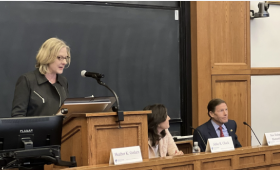As i’ll be 60 this year I suppos it’s time to report more geriatric news…
The Law School’s Solomon Center for Health Law and Policy hosted several panel discussions on Feb. 16 on addressing the issue of elder fraud and abuse in America.
As Americans are living longer on average, one in 10 Americans above the age of sixty have experienced some form of elder abuse, spanning both physical abuse and financial exploitation.
The issue is both critical and “intensely under-discussed,” per Abbe Gluck ’96 LAW ’00, founding faculty director of the Solomon Center for Health Law and Policy at Yale Law School.
To discuss the mechanisms that cause and may help prevent abuse and fraud targeting elderly Americans, the YLS community and individuals from across Connecticut convened in the Sterling Law Building on Feb. 16 for panel discussions at an event hosted by the Solomon Center.
The event, titled “Innovating Elder Justice: New Ways of Using Law, Medicine, and Technology to Address Abuse and Financial Exploitation in an Aging Society,” featured several panels led by lawyers and medical experts, with Sen. Richard Blumenthal LAW ’73 as the event’s keynote speaker.
“Today we heard about impactful inventions ranging from new screening tools in emergency departments to domestic violence initiatives, to apps that send alerts to family members when unusual bank account activity is detected,” Gluck wrote to the News. “There is so much work for us to do; today’s conversation was just the beginning.”
The event began with opening remarks from Law School Dean Heather Gerken, who underscored the importance of justice for elderly people within the legal landscape. She emphasized the increasing relevance of this area of law as life expectancy continues to rise, making it imperative to address the unique legal needs and challenges faced by elderly adults.
Gerken also spotlighted journalist Adrienne Drell LAW ’92, who attended the event, and former attorney Franklin Nitikman LAW ’66. In the 2019-2020 academic year, the Solomon Center launched the Adrienne C. Drell and Franklin W. Nitikman Elder Law Project, inspired and supported by Drell and Nitikman, aimed at exploring aging and the law through academic, experiential and theoretical lenses. Since its establishment, the program has facilitated numerous workshops and discussions addressing elder law and ageism issues.
Following Gerken’s opening remarks, Gluck highlighted the significance of the event, adding that the Law School is the first law school among the top law schools in the nation to host a conference on elder justice which she called “remarkable.”
Gluck then posed questions for Blumenthal on the role of government in protecting elderly people, first asking what the federal government can do.
Blumenthal stressed the importance of bipartisanship in the federal government when it comes to elder law. He emphasized the importance of the government in addressing issues of improving standards in assisted living facilities and combating fraud targeting seniors, particularly by proposing a framework for AI regulation to safeguard elderly people against online financial exploitation.
To this point, Blumenthal highlighted the Elder Abuse Prevention and Protection Act, signed into law in 2017, aimed at preventing elder abuse and exploitation while enhancing the justice system’s response to victims in such cases through data collection on elder abuse.
Blumenthal further emphasized the vulnerability of elders and advocated for updating laws to safeguard their rights, such as reforming conservatorship laws, wherein a court appoints someone to manage the affairs of a minor or incapacitated person.
He then discussed the need for oversight in nursing homes and assisted living facilities, pointing out that such oversight is often left to states, leading to significant variations in the quality of services provided from state to state. He advocated for enhanced federal oversight, encompassing rigorous inspections, to mitigate discrepancies in state standards and ensure accountability across facilities.
“I think transparency and oversight in the federal government can play great roles,” Blumenthal said.
Read more
Yale Law School hosts panels discussing elder fraud and abuse




